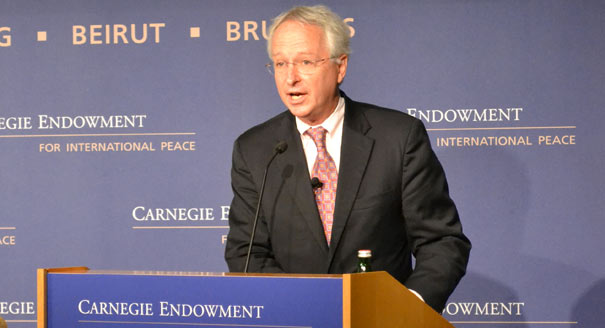Registration
You will receive an email confirming your registration.
American policymakers face continuing challenges in creating a constructive and sustainable relationship with Pakistan, and it may be time to consider a new approach. In his first public event since returning from Islamabad, Ambassador Cameron Munter spoke about the obstacles and opportunities ahead in Pakistan. Carnegie’s Frederic Grare moderated.
Competing Narratives
In Munter’s view, both the United States and Pakistan hold enduring—and frequently inaccurate—perceptions of the two nations’ relationship.
- Fair-weather Friends: Pakistanis, Munter argued, tend to believe that Americans aim to use Pakistan to achieve American goals, then abandon the relationship when it no longer serves Washington’s ends.
- A Wolf in Sheep’s Clothing: Munter believes that Americans, on the other hand, view the Pakistani government as duplicitous and manipulative, accepting U.S. aid and assistance even as it sometimes works to undermine American interests in the region.
The Failures of Bilateralism
- High Hopes: Munter pointed to 2008 as a turning point in Washington’s Pakistan policy. He identified a good-faith effort to balance crucial counterterrorism goals with a commitment to a stable Pakistan in the long term. Most notably, the United States increased civilian assistance to Pakistan dramatically with the Kerry-Lugar-Berman (KLB) bill, and the U.S. and Pakistani militaries began to cooperate more closely.
- Falling Short: Munter placed the blame for KLB’s failure to achieve systemic improvements in Pakistan’s civilian sector at the feet of the Pakistani state. Islamabad, he argued, lacked the state capacity to support government-to-government programs on which KLB so heavily relies.
- A Credibility Crisis: New hurdles emerged for U.S.-Pakistani relations throughout 2011—American contractor Raymond Davis’s arrest after he shot two Pakistanis, the friendly-fire incident at Salala, and the American raid on Osama bin Laden’s Abbotabad compound. Munter believes that these incidents reinforced caricatured narratives on both sides. He described how Pakistanis willing to work closely with Americans found they lacked the domestic capital to do so, and how American policymakers faced increasingly vocal calls to take a harder line on Islamabad.
Finding New Frameworks
-
Breathing Room: With the resolution of the dispute over NATO supply routes through Pakistan, Munter believes there may be an opportunity for the United States and Pakistan to find common ground—as long as both sides keep their expectations modest and avoid reprising the large-scale strategic aspirations of 2008.
-
Looking Beyond Government: Munter sees great potential for partnership in Pakistan’s civil society. Its businesses, universities, non-governmental organizations, and similar actors have not figured prominently in U.S. policy in the past, but he contends that there is room for slow but steady progress on building social links between the two countries.
-
International Opportunities: Munter explained how the United States can look to the region and the world to help strengthen and stabilize Pakistan. He reflected on Pakistan’s nascent détente with India, suggesting that an increasing Pakistani willingness to engage even with its traditional rival could offer a forum to discuss common goals and ways to achieve them.
